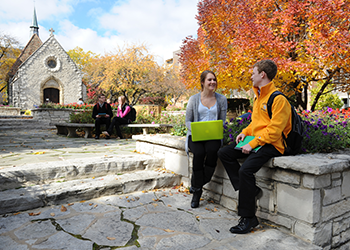BA in Spanish Language, Literature and Culture
Students will be able to:
1. Speak and write in Spanish at the Advanced Low proficiency level or higher, as defined in the ACTFL Proficiency Guidelines.
2. Read and listen in Spanish at the Advanced Low proficiency level or higher, as defined in the ACTFL Proficiency Guidelines.
3. Articulate and analyze the literatures of the Spanish-speaking world using discipline-specific approaches and methodologies.
4. Articulate and analyze issues surrounding Hispanic linguistics with discipline-specific approaches and methodologies.
5. Articulate and analyze issues surrounding Latin American, Iberian, and US Latinx communities.
6. Use Spanish with Hispanic and Latinx communities at home, abroad, and in their careers.
7. Develop critical thinking and cross-disciplinary problem-solving skills that can be used in a wide range of professional and academic contexts now and in the future.
BA in Spanish for the Professions
Students will be able to:
1. Speak and write at the Advanced Low proficiency level or higher, as defined in the ACTFL Proficiency Guidelines.
2. Read and listen at the Advanced Low proficiency level or higher, as defined in the ACTFL Proficiency Guidelines.
3. Analyze the literatures of the Spanish-speaking world using discipline-specific approaches and methodologies.
4. Articulate and analyze issues surrounding Hispanic linguistics with discipline-specific approaches and methodologies.
5. Articulate and analyze issues surrounding Latin American, Iberian, and US Latinx communities.
6. Use Spanish with Hispanic and Latino communities at home, abroad, and in their careers.
7. Demonstrate linguistic and intercultural competence to use their Spanish in professional contexts.
8. Develop critical thinking and cross-disciplinary problem-solving skills that can be used in a wide range of professional and academic contexts now and in the future.




